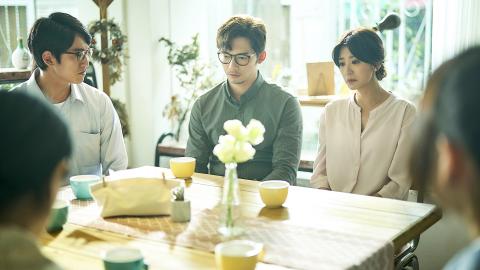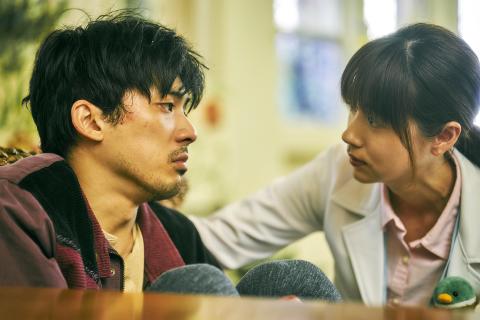Notorious MRT slasher Cheng Chieh (鄭捷) shocked the nation with his callousness when he told police, “I have been aspiring to do something huge since I was little (我從小就立志-做一件大事).”
The killer in the drama The World Between Us (我們與惡的距離) repeats the exact same phrase.
Taking inspiration from Cheng’s 2014 stabbing rampage that left four dead and 24 injured, the social realist drama, concluding in April, deviates from the over-idealized storylines with annoyingly flawless characters that plague Taiwanese shows. It delves straight into reality.

photo courtesy of Public Television Service
Providing a breath of fresh air from the heavily romance-oriented usual productions, The World Between Us depicts the aftermath of a mass shooting from the perspectives of the various parties involved, including the killer and his family, the victims and their families, the defense teams, the media, as well as the public’s reception.
The rom-coms are mostly geared toward a local female audience between the ages of 15 and 25, according to a 2010 survey conducted by Chinese Communication Society (中華傳播學會).
However, in recent years, the Taiwanese drama industry has begun to explore other themes and genres, most notably social realism, releasing series such as The World Between Us and On Children (你的孩子不是你的孩子), both of which have received critical acclaim at an international level.

photo courtesy of Public Television Service
What makes The World Between Us so powerful is not just the engaging plot, complex character development, and the actors’ great performances; it is that the drama has opened up conversations about the gray areas of morality, prompting the audience to rethink the line separating good and evil: Is a criminal defense lawyer so unforgivable? Is it morally justified to hate on a criminal’s family members? Does media weaponize opinion?
With a rating of 9.3 out of 10 on IMDb as of press time, The World Between Us has demonstrated wide global appeal, particularly among millennials. It epitomizes the rising trend of quality Taiwanese dramas that distinguish themselves from romcoms targeting local audiences, paving the way for Taiwan’s entry into the international market.
Similarly, On Children is a PTS production with a social realist theme. It centers around the potential negative effects of credentialism and extreme parental control on children’s psychological state.
Inspired by British science fiction television series Black Mirror, the drama takes an anthology approach and has a futuristic and sci-fi quality to it. The series is jointly distributed by PTS+, Netflix, and Line TV.
Both The World Between Us and On Children examine contemporary social issues that exist globally and aim to inspire thoughtful reflection. They may be outliers for Taiwanese dramas, but the incorporation of social issues is common in Western television series.
In an interview with Punchline (娛樂重擊), the writer of The World Between Us, Lu Shih-yuan (呂蒔媛), said that while addressing social issues through television series is not a groundbreaking idea in Western societies, the key issue in the lack of social realist productions in Taiwan lies in the fact that most Taiwanese broadcasting platforms are not prepared to show dramas with a serious subject.
In the case of The World Between Us, PTS willingly stepped up and offered to produce the series, kicking off the rising global visibility of the Taiwanese drama industry.
The social realism genre is particularly popular among millennials around the world — as a generation familiar with the use of social media and the sharing of information, ideas, and perspectives, they tend to be socially conscious and willing to engage in conversations about social justice.
Having ventured out of the typical romance narrative, the Taiwanese drama industry has successfully attracted international streaming services such as HBO Asia and Netflix, making great progress in expanding into foreign markets.

June 9 to June 15 A photo of two men riding trendy high-wheel Penny-Farthing bicycles past a Qing Dynasty gate aptly captures the essence of Taipei in 1897 — a newly colonized city on the cusp of great change. The Japanese began making significant modifications to the cityscape in 1899, tearing down Qing-era structures, widening boulevards and installing Western-style infrastructure and buildings. The photographer, Minosuke Imamura, only spent a year in Taiwan as a cartographer for the governor-general’s office, but he left behind a treasure trove of 130 images showing life at the onset of Japanese rule, spanning July 1897 to

One of the most important gripes that Taiwanese have about the Democratic Progressive Party (DPP) is that it has failed to deliver concretely on higher wages, housing prices and other bread-and-butter issues. The parallel complaint is that the DPP cares only about glamor issues, such as removing markers of Chinese Nationalist Party (KMT) colonialism by renaming them, or what the KMT codes as “de-Sinification.” Once again, as a critical election looms, the DPP is presenting evidence for that charge. The KMT was quick to jump on the recent proposal of the Ministry of the Interior (MOI) to rename roads that symbolize

On the evening of June 1, Control Yuan Secretary-General Lee Chun-yi (李俊俋) apologized and resigned in disgrace. His crime was instructing his driver to use a Control Yuan vehicle to transport his dog to a pet grooming salon. The Control Yuan is the government branch that investigates, audits and impeaches government officials for, among other things, misuse of government funds, so his misuse of a government vehicle was highly inappropriate. If this story were told to anyone living in the golden era of swaggering gangsters, flashy nouveau riche businessmen, and corrupt “black gold” politics of the 1980s and 1990s, they would have laughed.

In an interview posted online by United Daily News (UDN) on May 26, current Chinese Nationalist Party (KMT) Chairman Eric Chu (朱立倫) was asked about Taichung Mayor Lu Shiow-yen (盧秀燕) replacing him as party chair. Though not yet officially running, by the customs of Taiwan politics, Lu has been signalling she is both running for party chair and to be the party’s 2028 presidential candidate. She told an international media outlet that she was considering a run. She also gave a speech in Keelung on national priorities and foreign affairs. For details, see the May 23 edition of this column,